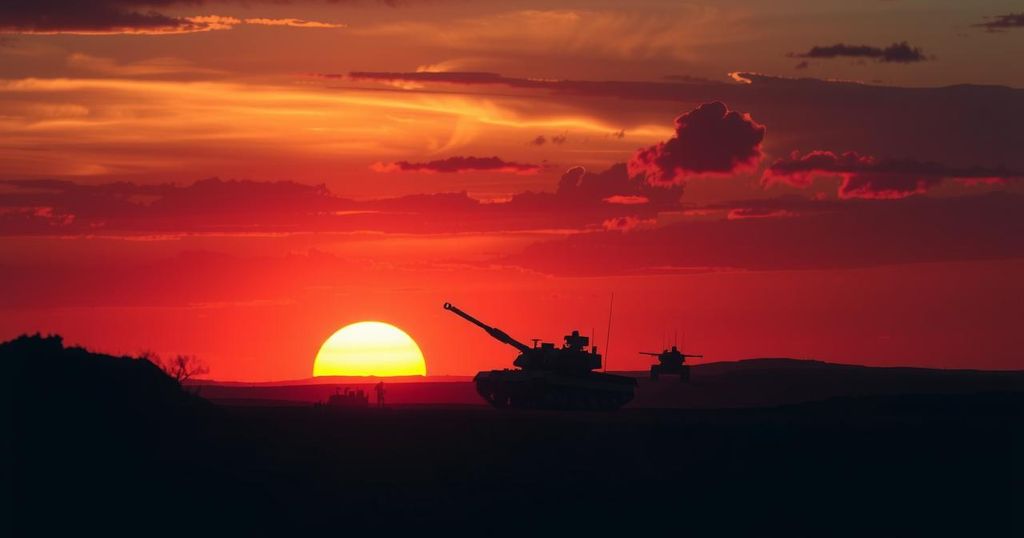Congo’s President Félix Tshisekedi has called for significant military mobilization to combat advancing M23 rebels backed by Rwanda. Despite urging enlistment among youth, Tshisekedi remains committed to seeking a peaceful resolution as regional partners press for negotiations. The M23’s control over key territories raises fears of instability, while ethnic tensions rooted in the Rwandan genocide complicate the conflict further.
GOMA, Congo — President Félix Tshisekedi has called for a significant military mobilization amid growing tensions with Rwanda-backed M23 rebels who have expanded their territorial control in eastern Congo. Addressing the nation, he urged young citizens to enlist in the army, emphasizing their vital role in defending the country. Although Tshisekedi reaffirmed a commitment to peaceful resolutions, his administration faces increasing pressure from regional partners to negotiate with the rebels.
The M23 group, allegedly supported by approximately 4,000 Rwandan troops, poses a significant threat to regional stability, controlling key locales, including Goma, a humanitarian hub for millions displaced by conflict. Witnesses report the rebels are advancing towards South Kivu’s provincial capital, Bukavu, raising alarms among the local populace. The Congolese military, strained by recent withdrawals of foreign contractors, struggles against the well-armed rebels.
A summit of the East African bloc has urged an immediate ceasefire and stressed the importance of dialogue with the insurgents. President Tshisekedi did not attend this crucial meeting, which included Rwanda, amid increased regional anxieties regarding potential conflict escalation. South African authorities have voiced their concerns, specifically holding Rwandan military forces accountable for the ongoing violence that has resulted in casualties, including South African peacekeepers.
The roots of the conflict trace back to deep-seated ethnic strife, exacerbated by the aftermath of the 1994 Rwandan genocide. M23 has positioned itself as a defender of ethnic Tutsis, claiming persecution by Hutu groups in Congo. However, analysts suggest that the rebels are poised to consolidate their control over eastern resources that are crucial to global industry.
Furthermore, the escalation of rhetoric between Rwandan and South African leaders heightens fears of broader conflict. Previous agreements have failed to halt Rwandan aggression, leading observers to label this situation as a failure of African mediation. The international community’s response remains critical, as the region anxiously watches events unfold.
The Democratic Republic of the Congo (DRC) has been embroiled in conflict for decades, primarily over its rich mineral resources valued at $24 trillion. This has invited multiple armed groups vying for control, including the M23 rebels, which have their origins in ethnic tensions from the Rwandan genocide. Following the collapse of prior peace agreements, the region faces turmoil as various nations react to the escalating violence, particularly surrounding Goma and Bukavu, crucial cities for humanitarian efforts. In recent years, the presence of foreign military contractors has waned, leaving Congolese forces vulnerable against the well-equipped M23 insurgents. Regional dynamics continue to shift as tensions between Rwanda and neighboring South Africa rise, complicating the search for stability and peace in the DRC.
The unfolding situation in the Democratic Republic of the Congo highlights the urgent need for military preparedness and strategic negotiations to manage escalating hostilities with M23 rebels. President Tshisekedi’s call for military enlistment underscores the seriousness of national defense amidst international pleas for a ceasefire. The conflict’s deep roots in ethnic strife require proactive measures to foster dialogue and prevent further regional destabilization, reflecting a crucial moment in Central African geopolitics.
Original Source: apnews.com




